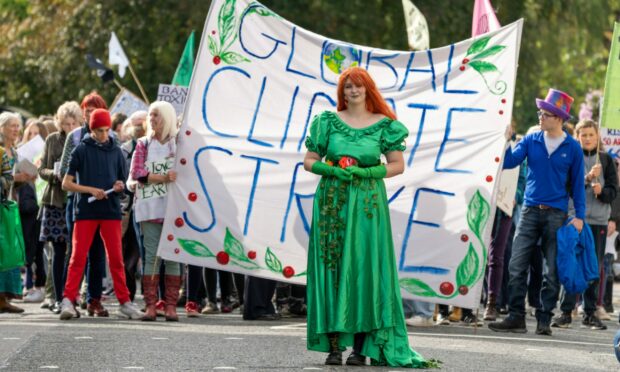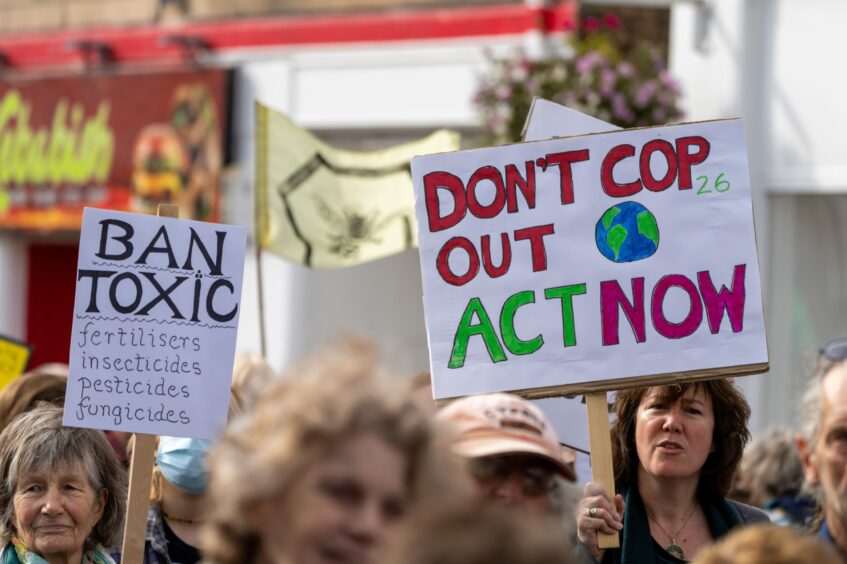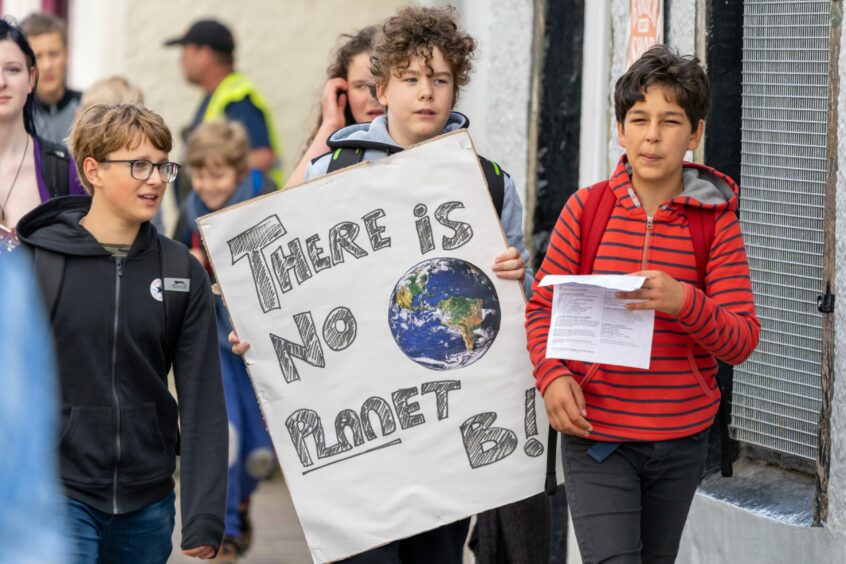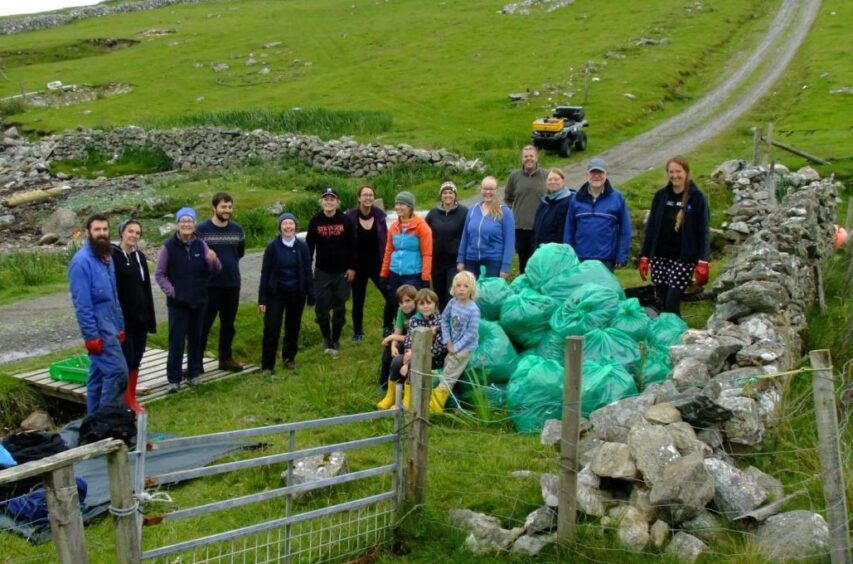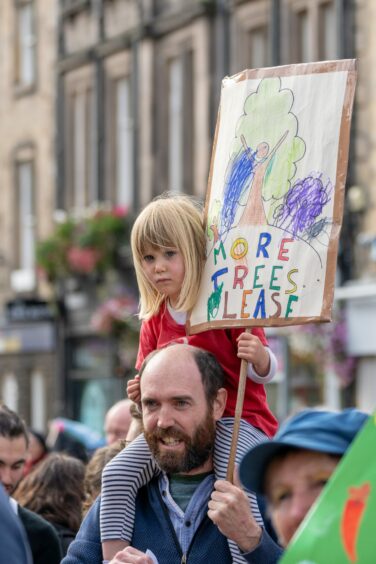At 18, Florence Spreadborough should be looking forward to everything life has in store for her.
Instead, it seems like she feels more anxious with each passing day.
“How can I imagine a worthwhile and exciting future for myself and my friends when the very stability of the world around me is constantly being threatened with irreversible changes to the climate, bringing more and more extreme weather and danger to so many across the world?”
And Florence isn’t the only young person who feels this way. She took to the streets on Friday afternoon, at the head of the Forres Earth March. And among the multigenerational crowd gathered to raise awareness of the ongoing climate crisis, dozens of young people lent their voices.
“Drowning in promises”
The march had a clear goal – convince world leaders to reduce greenhouse gas emissions by 50% by the end of the decade. If not, Florence and other young people say their future is in jeopardy.
Another organiser of the Forres Earth March, Julia Tucknott, said that world leaders need to reform unsustainable policies – and quickly.
“We are drowning in promises and suffocated by the lack of serious action.”
“Decision-makers are compromised by inertia and maintaining the systems that run the world. We desperately need new thinking.”
Friday’s strike was attended by marches of all ages, including local students. Although some of the younger pupils were already done with school by the time the march began, others missed class to show their support.
Climate change is a “serious matter”
Local homeschooler Max Dunway, 17, said that she’d like to see big corporations adopt sustainable practices to undo the damage done by global industries. But barring that, there is still something everyone can do to help.
“If every single individual person made small changes in their life it could help. But I think it’s important that a lot of larger global companies start taking it more seriously because those are the major contributors.”
Nairn Academy student Eric Ness, 15, travelled to Forres for Friday’s march. The more people who lend their voice to the cause, the better things will be, he said.
“I think young people should care about their future on this planet. It’s a serious matter that everyone should care about and I’m here to show support.”
Forres Earth March has urgent message for world leaders
The Forres Earth March coincided with the build-up to COP26, the 26th United Nations Climate Change conference. It will take place in Glasgow between October 31 – November 12.
The participants in the Earth March in Forres are urging leaders to commit to reducing emissions by 50% before the end of the decade. According to the UN’s Intergovernmental Panel on Climate Change, this is one of the final windows to reduce serious future climate risks.
A recent study from the University of Bath found that nearly half of the world’s young people struggle with anxieties tied to the climate crisis. The study surveyed 10,000 people between the ages of 16-25 in 10 countries.
Three-quarters agreed that the “the future is frightening.”
Others added that they didn’t feel like others are taking their comments on clime change seriously.
Local steps toward a global goal
But taking small steps and building habits can amplify the message about climate change, said Inne Withouck, a PhD candidate at the University of the Highlands and Islands Shetland.
She studies how existing users of the marine space, such as the fishing industry, are considered during the planning of renewable energy projects at sea. Through her research, she has found that a shift toward sustainability needs to consider social justice as well as social acceptance.
“To minimise conflict and have more social acceptance, through conducting interviews I realised it’s more about co-creation. It’s about designing a solution together rather than hoping there’ll be acceptance of an outside solution.”
As a member of UHI’s Environment and Sustainability Group – which includes members from all 13 campuses – she and her colleagues discuss major issues while tackling everyday challenges in their areas.
“Everything that we do can be done in a more sustainable way. It’s important to appreciate the small steps and changes people make in daily life. That encourages others to do the same. As the UHI sustainability group, we think that’s a really important atmosphere to create.”
And in the war against climate change, not every battle takes place in international board rooms. She said that local sustainability projects don’t have to be world-beaters.
“We organised a beach clean this summer for a family who lives in an area where the natural currents cause litter to accumulate. And that was so rewarding because they just really needed a pair of hands to help move that stuff. It’s great to remember you can also be really useful locally as an environmental society.”
Want to take part?
A group of young activists founded Fridays for Future Scotland in 2019. Inspired by Greta Thunberg and other environmental activists, their mission is to convince Scottish leaders to adopt more sustainable practices.
You can learn more about the group and how to take part in local actions like the Forres Earth March.
But pupils in the north and north east don’t always have to miss class to advocate for climate justice. Almost 700 schools across the region are part of Keep Scotland Beautiful’s Eco-Schools program. Of those, more than 100 have won Green Flag Awards, a recognition of their commitment to sustainable education.
Keep Scotland Beautiful is currently offering a free online course about the current climate emergency.
Young people leading the fight, but should they have to?
One of the speakers at the Forres Earth March, Allan Watson Featherstone praised young people like Florence, Max and Eric for using their voices. But in the end, they aren’t the ones making decisions. Not yet, at least.
Instead, it falls to current leaders and the older generation to make a priority of building a more sustainable future, he said.
“It’s great to see young people involved and taking the initiative. But they shouldn’t have to.
“We can’t leave it to them, there isn’t time. it’s their future that us older people are determining.”
Read more from the Schools and Family team
Does the ‘pink tax’ make it more expensive to buy uniforms for girls?
